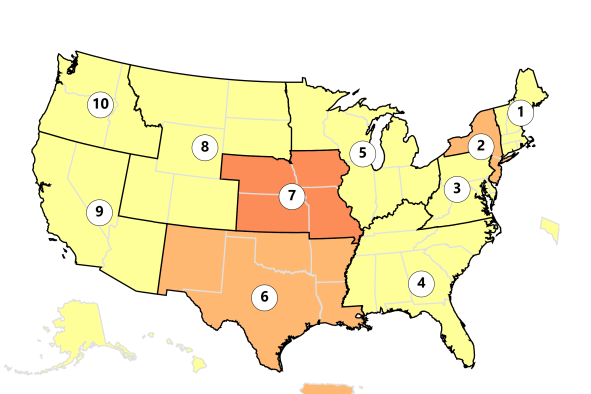Children born to mothers who were overweight before or during pregnancy are more likely to develop conditions such as autism spectrum disorder (ASD) and attention deficit hyperactivity disorder (ADHD), according to Australian meta-analysis.
Obesity during pregnancy was found to more than double the risk of a child developing ASD, and increase the risk of ADHD by 32 percent.
"Given the rising global obesity rates among women of reproductive age, and the growing numbers of children identified with neurodiverse conditions, it's important that we acknowledge the potential long-term consequences of maternal adiposity on child mental health," said lead researcher Dr. Bereket Duko of the University of South Australia, in a statement.
According to figures from the Centers for Disease Control and Prevention, 41.9 percent of U.S. adults have obesity, and approximately 30 percent of U.S. mothers began their pregnancy with obesity.
"Maternal obesity has long been associated with a range of adverse perinatal outcomes, including preterm birth, low birthweight, stillbirth, and it is also linked with macrosomia, or high birthweight," said Duko.
"In this study, we examined maternal overweight and obesity before and during pregnancy, finding that both are significantly linked with psychiatric and behavioral problems in children later in life, specifically ASD, ADHD and peer relationship problems."
Autism, or ASD, is a lifelong condition that can mean individuals tend to struggle to communicate with others; feel overwhelmed or stressed by sensory input, such as bright lights or loud noises; feel anxious in unfamiliar or surprising situations; find comfort in repetition and routine; and may have learning difficulties.
People with ADHD may struggle to concentrate; become hyper-focused on certain tasks; feel restless; act impulsively; get distracted easily; and experience time-blindness where they struggle with time management.
This research was a collaboration between multiple universities, research institutions and hospitals across Australia, involving the meta-analysis of 42 studies, and more than 3.6 million pairs of mothers and children, from all over the world.
The scientists found that mothers who had obesity before they got pregnant had a 42 percent increased risk of their children developing ASD; for mothers with overweight, this number was 9 percent.
They also found a mother's pre-pregnancy obesity was associated with a 57 percent increased risk of her child developing ADHD, while pre-pregnancy overweight was associated with an 18 percent increased risk.
Meanwhile, mothers who were overweight during pregnancy had a 19 percent increased risk of their children developing ADHD.
A link was also found between maternal obesity and conduct disorders: mental health conditions diagnosed in children and teenagers who display consistently aggressive and disobedient behaviors.
Mothers who had obesity during pregnancy were found to have a 16 percent increased risk of having a child with a conduct disorder—but no association was found if the mother was just overweight.
"Public health efforts that target improving maternal health could help mitigate some of the risks of neuropsychiatric and behavioral disorders in children," said Duko.
Overall, the scientists found links between mothers who had overweight and obesity before pregnancy, and an increased risk of ASD, ADHD, conduct disorders and psychotic disorders in their children.
They also found that overweight mothers had a 30 percent increased risk of having children who had noticeable symptoms of neurological or behavioral disorders and had difficulties developing normal relationships with their peers.
However, they did not find any significant links between maternal overweight before or during pregnancy and their children developing mood disorders, anxiety, personality disorders, eating disorders or sleep problems.
The study did not investigate the reasons why these associations might exist, so they could not come to concrete conclusions about why obesity during pregnancy seemed to be linked with neurological conditions in children.
But they did put forward several possible reasons why the two might be linked. For instance, it might be because of the chronic inflammation that is associated with obesity, they wrote, or because of problems with the mother's metabolism, or hormonal imbalances resulting from too much fat tissue, which could affect the womb and disrupt the development of the baby's brain.
Alternatively, the paper suggested that excess weight during pregnancy could negatively impact a mother's mental health, which could in turn affect the development of the baby once it was born.
Or, the scientists wrote, the link could be because of the many conditions which commonly occur alongside excess weight in pregnancy—such as gestational diabetes, a potential risk factor of which (called arachidonic acid) might also play a role in early brain development.
"While further research is needed to explore the biological mechanisms underlying these associations, the findings do stress the need for health interventions that promote healthy living and weight among parents-to-be," said Duko.
This study was funded by the Centre of Research Excellence in Health in Preconception & Pregnancy, Australia.
Do you have a tip on a food story that Newsweek should be covering? Is there a nutrition concern that's worrying you? Let us know via science@newsweek.com. We can ask experts for advice, and your story could be featured in Newsweek.
Reference
Duko, B., Megistu, T. S., Stacey, D., Moran, L. J., Tessema, G., Pereira, G., Bedaso, A., Tesfay Gebremedhin A., Alati, R., Ayonrinde, O. T., Benyamin, B., Hong Lee, S., Hyppönen, E. (2024). Associations between maternal preconception and pregnancy adiposity and neuropsychiatric and behavioral outcomes in the offspring: A systematic review and meta-analysis, Psychiatry Research 341(116149). https://doi.org/10.1016/j.psychres.2024.116149
Disclaimer: The copyright of this article belongs to the original author. Reposting this article is solely for the purpose of information dissemination and does not constitute any investment advice. If there is any infringement, please contact us immediately. We will make corrections or deletions as necessary. Thank you.



